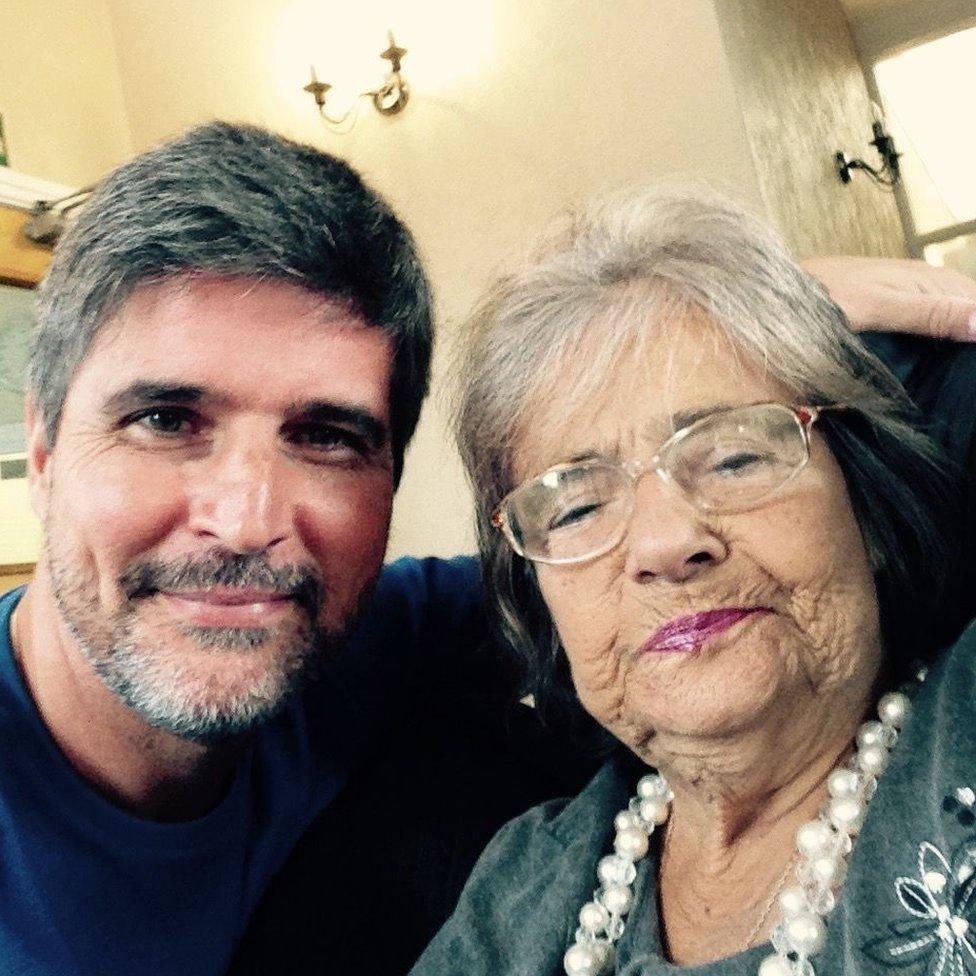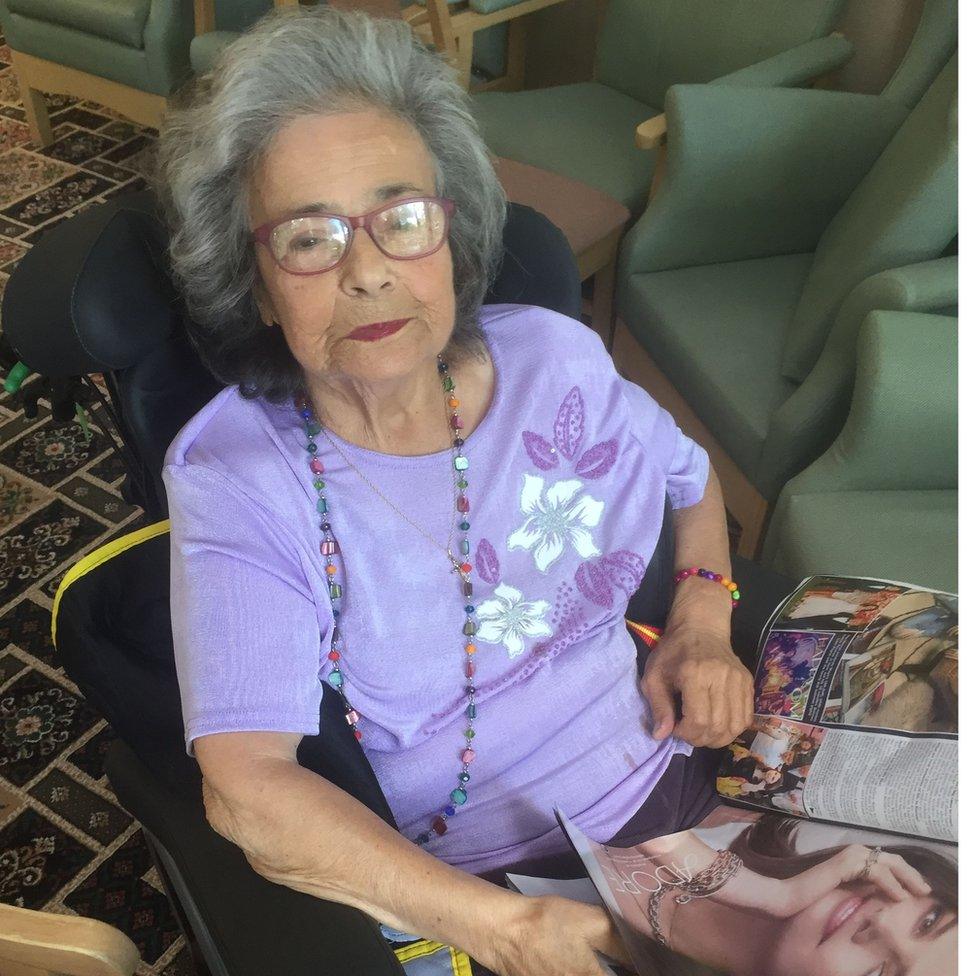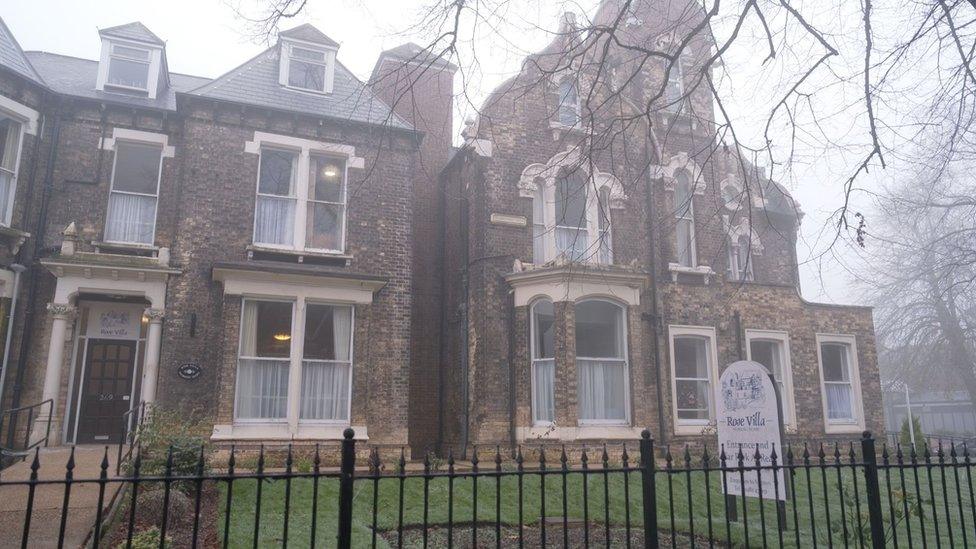Pandemic care home death: Family to sue over mother's end-of-life consent
- Published

During the first nationwide lockdown in 2020, Tony Stowell was only able to see his mother Antonia through a window at her care home
A man plans to sue a nursing home because, he says, during the pandemic his mother was put on end-of-life care without her family being told.
Antonia Stowell, 87, did not have the mental capacity to consent because she had dementia, say the family's lawyers.
Her son, Tony Stowell, said if end-of-life care had been discussed, he would not have agreed to it.
Rose Villa nursing home in Hull says all proper process in Mrs Stowell's care was followed with precision.
Mr Stowell said that when he learned of the nursing home's decision, he insisted his mother was moved to a hospital, where she later died.
As a prelude to legal action, Mr Stowell's lawyers have obtained his mother's hospital records which, they say, show she was diagnosed with suspected pneumonia while living in the home. End-of-life drugs were then prescribed and ordered by medical professionals.

During the first pandemic lockdown in 2020, Mr Stowell said that although he was not allowed inside, he visited his mother regularly and would see her through a window, but in May that year, she suddenly seemed to deteriorate.
"When I looked through the window she was just slumped in her wheelchair," he said.
"Something was just telling me it was different. It didn't look right to me. So I am banging on the windows and the doors and I said 'what's wrong with my mum?'.
"They said 'it's fine, she's just sleeping'.
"I said 'it looks like she is dead in there'."
The following day, he said, he was told over the phone by the home that his mother had been put on end-of-life care.
He said he had to break the news to his equally shocked siblings, and the family insisted their mother was moved to Hull Royal Infirmary hoping she could receive treatment, but she died there the next day.
"They should have consulted all family members. The care home would always phone each family member if Mum didn't feel well or had a headache. I always got calls from them. This is why I am so angry," Mr Stowell said.
In a statement, Rose Villa said: "We believe that our dedicated and professional team provided Antonia with the very best care under the direction of her GP and medical team, and all proper process in the delivery of this care was followed with precision."

Rose Villa nursing home is registered for a maximum of 49 residents, its website says
Mr Stowell's lawyers, Gulbenkian Andonian solicitors, said his mother's hospital records reveal the decision to put her on end-of-life care was made two days before the family was told.
In their letter to the home announcing the planned legal action, they said Mrs Stowell could have had "48 additional hours on a ventilator with treatment… with the necessary implication that Antonia Stowell could still be with us today or at least survived".
The lawyer dealing with the case, Fadi Farhat, told the BBC: "As a matter of law, there is a presumption in favour of treatment which would preserve life and prolong life, irrespective of one's age or condition.
"Therefore to deviate from that presumption means a patient, or family members, should be consulted as soon as that decision is made or contemplated."
He adds: "What is particularly concerning for me is this case occurred at the height of the pandemic. That should worry everybody because it demonstrates that rights can be suspended in times of crisis, when the very purpose of legal rights is to protect us during times of crisis."
Mr Stowell has also launched a campaign for an "Antonia's Law" to give care home residents the right to have cameras in their rooms so relatives can monitor them.
Mr Farhat said other families have now been in touch, saying their relatives were put on end-of-life care without consultation, echoing wider concerns about "do not resuscitate" decisions during the pandemic.
In its statement, Rose Villa added: "The Covid pandemic has hit the social care sector extremely hard. Despite the numerous challenges this has presented, the team at Rose Villa care home have always strived to provide the very best care for all our residents and are fully committed to delivering the highest level of care now and into the future."
Mrs Stowell's death certificate said she died from Covid and dementia.
A Department of Health and Social Care official said decisions taken for people assessed as lacking mental capacity must be made in their best interests.
"The Mental Capacity Act places a duty on the decision-maker to consult those interested in the person's welfare where practicable and appropriate," the officiial added.